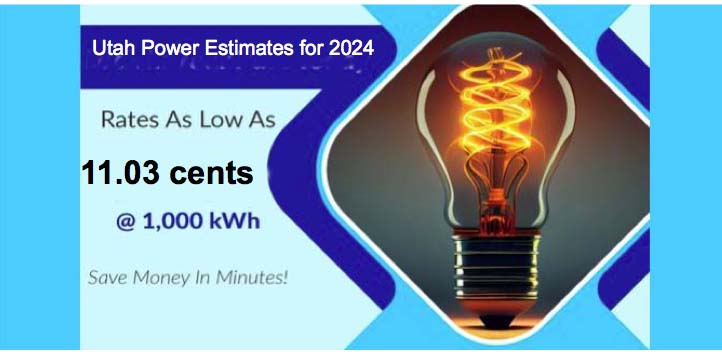A recent nationwide study by Texas Electricity Rating has predicted that average Utah households will pay the cheapest electricity rates in the country in 2024. That research found that Utahns will pay at little as 11.03 cents per kilowatt-hour for electricity, compared to 43.53 cents paid by residents of Hawaii (Image courtesy of Texas Electricity Ratings via Facebook).
SALT LAKE CITY – Although it may seem like everything has become more expensive in recent years, Utahns can at least console themselves with recent news that the Beehive State is paying less for electricity than the rest of the country.
That’s the conclusion of a nationwide study by the power analysts at Texas Electricity Ratings, based on a state-by-state comparison of data from the Environmental Investigation Agency.
Their research predicted that the average Utah homeowner — despite having to endure a 4.5 percent spike in energy prices over the past two years — would pay only $1,047 for electricity throughout 2024.
That estimate that comes as no surprise to Sen. Scott Sandall (R-Tremonton).
“Utah is predicted to have the cheapest electricity cost in the U.S.,” trumpeted Sandall in a recent newsletter to northern Utah constituents.
“Energy powers every aspect of our lives,” he reminded local residents. “(It) fuels our vehicles, keeps us warm during cold winters, cool during the hot summers and powers our cities and businesses.”
The average electricity expense for Utah homeowners in 2024 is expected to be about $700 less than the national average and a whopping $2,500 than the electric bills in the nation’s most expensive state, Hawaii.
Those savings didn’t come about by some lucky accident, according to Sandall, but rather by careful planning and husbanding of resources.
“During this legislative session,” he explained, “we passed several energy bills that will help us develop a more robust and sustainable energy sector to ensure Utah’s future generations can afford to keep the lights on.”
Among the new laws affecting energy production is Senate Bill 161 (Energy Security Amendments), introduced by Sen. Derrin Ownes (R-Fountain Green).
That proposal allows a project entity issued a transition permit for a new electrical generation facility to apply to the Division of Air Quality for an “alternative permit.” If an alternative permit is issued, it would allow some existing generating units at a facility to continue operating.
The bill also creates an authority in the Office of Energy Development to evaluate electrical generation facilities intended for decommissioning, requiring the authority to submit an alternative air permit application, determine the fair market value of the project entity and consider offers to purchase the decommissioned assets.
Sandall also introduced Senate Bill 224 (Energy Independence Amendments). That new law would empower the Utah Public Service Commission to continue to operate two coal-fired power plants in Emery County while surrounding states begin to cut their use of coal. Both of those bills that would impact Utah’s energy future passed the Legislature and are now on Gov. Spencer Cox’s desk awaiting his signature.
To make its cost predictions, the power experts at Texas Electricity Ratings examined electricity consumption in each state identified by analyzing the latest state-by-state EIA data. This analysis provided insights into the kilowatt usage per household. The prediction of electricity bills for 2024 involved comparing consumer electricity costs between November 2022 and November 2023, then projecting costs for the current year. During that period, average Utahns paid only 11.03 cents per kilowatt-hour of electrical power, while Hawaii residents paid 43.53 cents per kilowatt-hour.
“Where household electricity bills increased an average of 3.38% across the nation in 2023,” according to a TER spokesman, “consumers must gain insight into the factors shaping their electricity bills, going beyond the total costs for 2024.”
The TER analysts suggest that households can also reduce energy cost by embracing more energy-efficient practices like optimizing refrigerator and freezer temperatures; reducing shower durations; and incorporating energy-efficient lighting options like LEDs or motion-sensor lights. Even choosing to wash clothes in warm or cold water, as opposed to hot water, makes an impactful step towards achieving both financial savings and environmental sustainability.
For more information about the nationwide study by Texas Electricity Ratings, residents are encourage to go online to https://texaselectricityratings.com/.
Founded in 1984 in the United Kingdom, the Environmental Investigation Agency is an award-winning non-profit group that is internationally renowned for its use of innovative investigative techniques that expose environmental concerns and make sustainable management of the world’s natural resources possible.
Texas Electricity Ratings is a non-profit group that reads ranks, and analyzes the best of some 1,800 energy providers available to Texans since 1999, making sure that they are aware of the best rates from the best providers.

